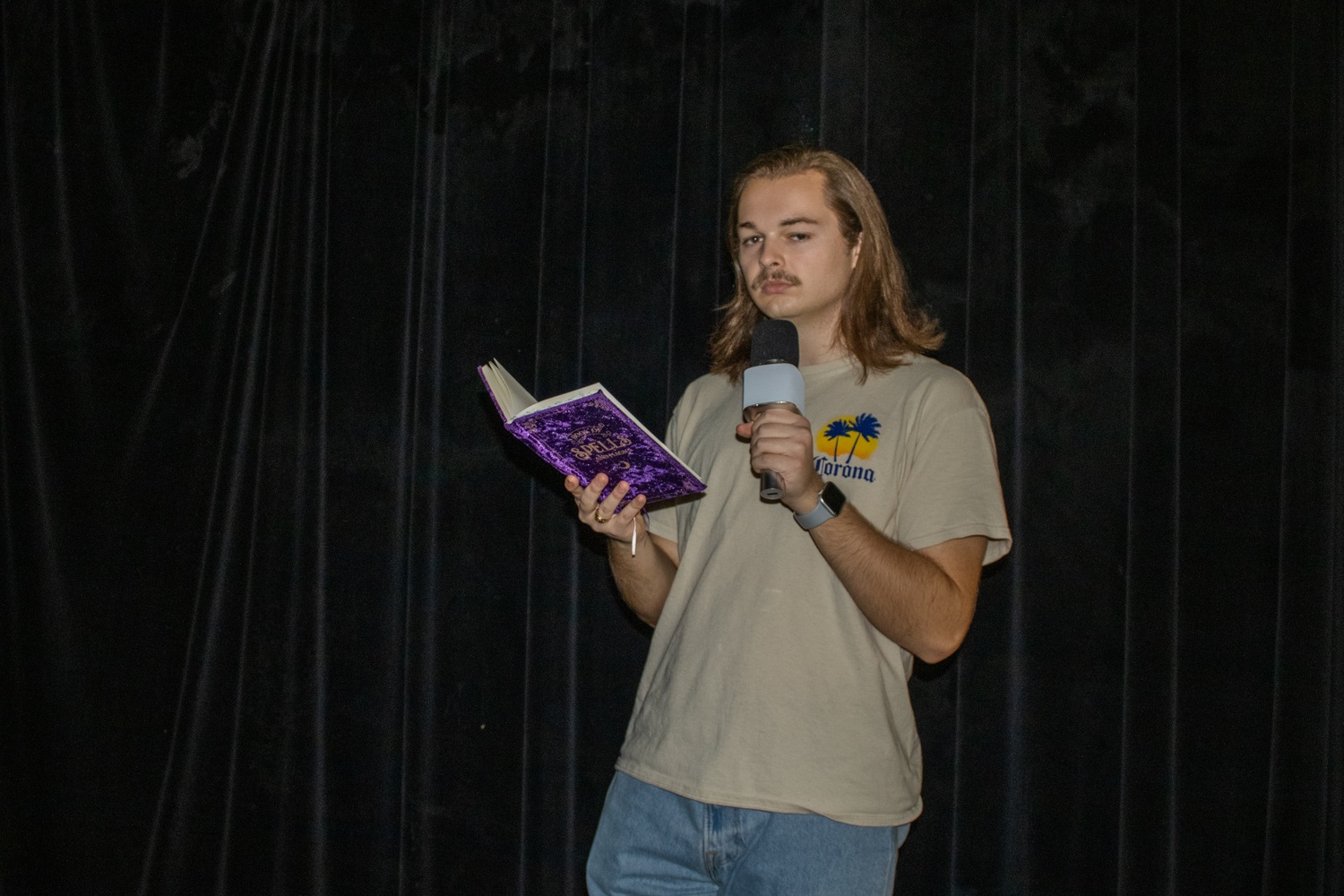
Class Clown: Gibson Bartlett
Gibson D. Bartlett ’25 and I have found ourselves in the Cabot Theater, me sitting on stage and him across on an endearingly ugly sofa. I realize we should probably be sitting the other way around — Gibson’s the one cracking jokes, and I’m his main audience. Luckily, once a year, the stage belongs entirely to him.
“Years ago, we had the One Gibson Show,” he tells me. His one-man comedy show ran for approximately an hour and featured singing, dancing, acting, and original arrangements. A tradition was born. In his second year as a Cabotian, Gibson put on the One Gibson Show Two: The Gibsoning. The show will return to the Cabot Theatre for the third time this spring. (Putting “One Gibson Show Three: Gone with the Gibson” out there as an option, but up to you, Gibson.)
Though a one-man show may seem daunting to the rest of us, Gibson is primed for the spotlight. He served as the co-president of the Harvard College Stand-up Comedy Society, through which he has performed his comedy many a time. This past summer, he performed a 40-minute set at an arts festival in an English village. Though Gibson had never tried stand-up before college, he now describes it as a “great tool for dealing with the weirdness of the world and turning it into joy.”
“Stand-up is a very vulnerable thing, to get up on a stage and say, ‘I believe I am funny, and here’s my material,’” he explains. “The audience is gonna laugh or they don’t. They’re the judge, jury, executioner.”
Still, he says of stand-up, “It’s such a fun space for play. There’s not enough play in this world.”
Gibson has a talent for playing with words, not only as a comic but as a poet and writer. As a joint concentrator in English and Women, Gender, and Sexuality Studies, Gibson is writing a personal and comedic memoir for his senior thesis, which draws on his roots in southern Appalachia.
His interests in creative writing and comedy are deeply intertwined. Through both mediums, Gibson can dig into the “complexities and confusions” of the world and interrogate what troubles him. “Stand-up is a route to take that into something that creates light, and humor, and joy,” he says. “And poetry is a way to sit with that in a different emotional register, and bring something out of the stakes of creating a new world in a poem.”
Though Gibson was awarded Class Clown, he toyed with the idea of changing his title to “Voice of a Generation,” which I would have endorsed, or “Best Hair,” which he could have easily won, with or without endorsement. Throughout our interview, he somehow weaves together subtle, funny quips with profound statements about the power of language in affirming one’s sense of self.
“I really like stand-up from comedians who are very aware of who they are and what role they play in the world, and can have fun with that and subvert that,” Gibson says. He takes inspiration from comedians like Leanne Morgan, who he says he loves because she reminds him of his mom.
Gibson describes his style of comedy as observational, shaped by listening to others and paying attention to the things around him. “I never thought of myself as a funny person before I came to college, but I’ve always thought of it as a good tool for bridging differences, for meeting new people,” he says. “It’s just good to be able to bring levity to a situation.”
He wrote for SatireV, a Harvard comedy magazine, and has been inspired by a motto they repeat throughout their comp process: “Afflict the comfortable and comfort the afflicted.” To Gibson, this motto represents the importance of using comedy for good.
Comedy has also taught Gibson the valuable lesson that failure is natural and okay. He originally joined HCSUCS after facing rejection from Harvard’s many competitive extracurriculars. “I came into college thinking I was going to be an a cappella baddie,” he tells me. Though he found a home in stand-up, failure continues to be a part of his process.
“There have been many times where I have just gone up there and bombed,” he starts. “But the great thing is, it doesn’t matter, because a lot of those times I bombed, I was in a foreign country, and I left that country, and I don’t have to go back.”
(Later, he adds, “It’s taught me to take life a little less seriously, and that has opened up boundless joy.”)
When I ask Gibson if he ever feels pressure from others to be funny, he answers, “Yes! Yes. This interview is the hardest thing I’ve ever done!” But he has nothing to worry about; he’s charmed me completely, made me laugh, and left me with the motivation I needed to try something new and creative, to fail, to try again.
He’s even sent me off with a new catchphrase. “Ask me, how am I,” he says.
“How are you?” I follow.
“Delicious.”
— Associate Magazine Editor Michal Goldstein can be reached at michal.goldstein@thecrimson.com. Follow her @bymgoldstein.


